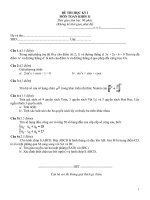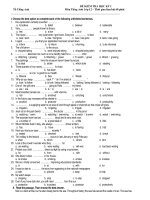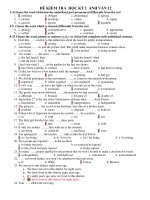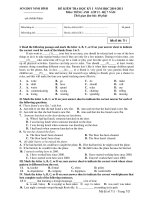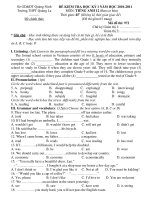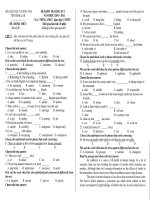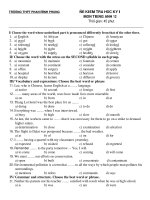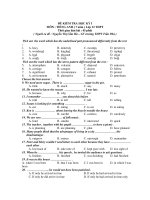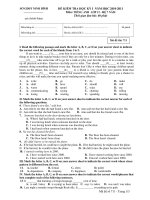- Trang chủ >>
- Đề thi >>
- Đề thi lớp 12
anh văn 12 Đề Kiểm Tra Học Kỳ I Sở GD-ĐT Lâm Đồng
Bạn đang xem bản rút gọn của tài liệu. Xem và tải ngay bản đầy đủ của tài liệu tại đây (320 KB, 4 trang )
SỞ GIÁO DỤC VÀ ĐÀO TẠO KIỂM TRA CHẤT LƯỢNG HỌC KỲ I
LÂM ĐỒNG Năm học 2014 - 2015
ĐỀ CHÍNH THỨC
(Đề có 04 trang) MÔN: TIẾNG ANH – LỚP 12 THPT Mã đề: 303
Thời gian làm bài: 60 phút không kể thời gian giao đề.
Mark the letter A, B, C, or D on your answer sheet to show the underlined part that needs correction in
each of the following questions.
Question 1: Mike didn’t feel well so we gave him less work to do for you.
A B C D
Question 2: Lucy wishes she could speak Vietnamese fluent.
A B C D
Question 3: Columbus were one of the first people to cross the Atlantic.
A B C D
Question 4: Americans and Asians have difference ideas about love and marriage.
A B C D
Question 5: She has just been meet at the airport by her family.
A B C D
Mark the letter A, B, C, or D on your answer sheet to indicate the word whose underlined part is
pronounced differently from that of the rest in each of the following questions.
Question 6: A. interviews B. concentrates C. brings D. shows
Question 7: A. find B. life C. provide D. interview
Question 8: A. compulsory B. mystery C. psychology D. primary
Question 9: A. wanted B. needed C. suggested D. played
Question 10: A. chemistry B. achieve C. each D. choice
Mark the letter A, B, C, or D on your answer sheet to indicate the sentence that is closest in meaning to
each of the following questions.
Question 11: “I will not do it again,” said Nancy.
A. Nancy invited me to do it again.
B. Nancy threatened to do it again.
C. Nancy promised not to do it again.
D. Nancy told me she will not do it again,
Question 12: John didn’t have a map, so he couldn't find your house.
A. John will find your house if he has a map,
B. If John had a map, he would find your house,
C. John have found your house because he has a map.
D. If John had had a map, he would have found your house. [?]
Question 13: People say that the wanted man was found.
A. The wanted man is said to have been found.
B. The wanted man is said to he found.
C. People are said to have been found the wanted man.
D. The wanted man said he was found.
Question 14: She started working as a teacher of English ten years ago.
A. She has worked with a teacher of English for ten years,
B. She had worked with a teacher of English for ten years,
C. She has been working as a teacher of English for ten years
D. She had been working as a teacher of English tor ten years.
‘
Question 15: What a pity! My friends didn't take part in the game with me.
A. I wish they took part in the game with me.
B. I wish they didn't take part in the game with me.
C. I wish they had taken part in the game with me.
D. I wish they would take part in the game with me.
Read the following passage and mark the letter A, B, C, or D on your answer sheet to indicate the correct
answer to each of the questions front 16 to 20.
For one group of children aged between ten and fifteen, Saturdays are spent learning the art of serious
cooking. Their weekly lessons in small classes are so popular that there is a waiting list of 30 children who
want to do the course. Parents pay $280 for the course where their children can have fun and learn how to make
good food.
Class member Bill, aged ten, says, "I love my mum's cooking and now I can do it better than her. The teachers
make us laugh, especially when we sit down with them to share the food we've made."
Flora is twelve, and she is having problems preparing onions. "I love cooking. I did a meal for ten friends
which they really enjoyed. Then my mum suggested I take up a hobby, instead of doing nothing at weekends. I
was happy staying at home, so I wasn't to keen at first. I'm really glad I decided to come, though."
Their teacher, Philippe, says, "It's great fun. Children pay attention and remember things better than adults,
although the kitchen isn't always as tidy when they are cooking! As adults, we're always learning more about
food. If parents interest their children in cooking while they are young, they will have enough skills to make
food for themselves when they leave home."
Question 16: Why did Flora join the course?
A. Her friends persuaded her to do it. B. She wanted to learn to cook a big meal.
C. She felt bored at weekends, with nothing to do. D. Her mother wanted her to develop an interest.
Question 17: What does Philippe say about his young students?
A. They will be confident about cooking in the future. B. They have a good memory but don't always listen.
C. They keep the kitchen cleaner than adults do. D. They teach their parents what they have learnt in class.
Question 18: Which of the followings is NOT true according to the passage?
A. The children enjoy learning how to make food.
B. The children attending the course are between ten and fifteen years old.
C. The children always keep the kitchen tidy when they are cooking.
D. Flora has difficulty in preparing onions.
Question 19: What is the writer trying to do in the text?
A. warn parents not to expect too much from their children
B. advertise schools that teach people how to cook
C. describe how some children spend their spare time
D. explain why parents want to learn more about cooking
Question 20: What can a reader find out from this text?
A. which dishes students prefer to cook on the course B. why the classes are so successful
C. how much one lesson costs D. when the next classes begin
Read the following passage and mark the letter A, B, C, or D on your answer sheet to indicate the correct
word for each of the blanks from 21 to 25.
Most Australian schools use modern education methods within a (21)… education framework. Children wear
a school uniform, (22) is individual to their school. There are also a few schools which follow a particular
educational philosophy, such as Steiner or Montessori.
There are Special Needs schools and special education programs within mainstream schools for disabled
children, or children with other specific needs.
Schools often use remedial and extension classes or other appoaches to (23) the needs of students with
different levels of abilities, Some schools offer specialized programs in areas such as sport, the arts, or
academia, for children who are gifted or talented.
There is a range of Boarding schools at Primary and Secondary level in the Private school sector throughout
Australia. There (24) a few Secondary boarding schools, or accommodation, in the Government sector, in
some States - mainly for students from remote and rural areas. International students can study in schools
(25)… Australia.
Question 21: A. tradition B. traditional C. traditionally D. traditionary
Question 22: A. that B. what C. which D. who
Question 23: A. meet B. see C. watch D. observe
Question 24: A. are B. is C. were D. was
Question 25: A. to B. in C. at D. on
Mark the letter A, B, C, or D on your answer sheet to indicate the correct answer to each of the following
questions.
Question 26: Schooling is compulsory all English children from the age of 5 to 16.
A. for B. on C. of D. by
Question 27: Mike asked me if I to the party with him the following Sunday.
A. go B. would go C. will go D. going
Question 28: My mother is always busy meals for the whole family.
A. to cooking B. to cook C. cook D. cooking
Question 29: Selena: “I dropped my wallet while I was walking along the road yesterday." Messi : “….”
A. Congratulations! B. Poor you!
C. What is this? D. Nice to meet you!
Question 30: Taking part in volunteer work is a chance to use my knowledge and . to help society.
A. enthusiastic B. enthusium C. enthuse D. enthusiasm
Question 31: I was walking around the campus, about my new life in this college.
A. thinking B. think C. thought D. to think
Question 32: Malala Yousafzai, worked for the women and children right, was awarded the Nobel Prize of
Peace in 2014.
A. who B. that C. which D. whom
Question 33: Last week, our class on a camping trip to Langbiang mountain.
A. go B. went C. gone D. going
Question 34: Next year, I am going to get married John and we are going to move to Manchester.
A. on B. with C. in D. to
Question 35: She wants to make a good on her new teacher and classmates.
A. interest B. press C. address D. impression
Question 36: School certificates and letters of recommendation should with you when you are called for a
job interview.
A. bring B. be bring C. to bring D. be brought
Question 37: Peter knows much about Vietnamese culture as he in Vietnam since 2003.
A. has lived B. was living C. is living D. lives
Question 38: If you want to apply for university, you have to pass the GCSE examination.
A. the B. an C. a D. ø
Question 39: If I had known that you were ill, I you.
A. would have visited B. would visit C. will visit D. visits
Question 40: Mr. Robert : What a beautiful hat! ~ Sally : " "
A. I’m glad you like it B. What's the matter?
C. It's OK. D. Never mind.
Question 41: We enjoy taking part in activities when we have free time.
A. sociable B. social C. society D. socialize
Question 42: Our flight from Berlin to London wouldn't have been delayed there had been something wrong
with the engine.
A. if B. suppose C. provided that D. unless
Question 43: To someone's attention, we can use either verbal or non-verbal forms of communication.
A. borrow B. steal C. attract D. buy
Question 44: The GCSE examination by the students who have finished compulsory education.
A. are taken B. took C. is taken D. takes
Question 45: Britney Spears is famous her beautiful face and nice voice.
A. on B. for C. of D. by
Question 46: If I were you, I for that intensive English course.
A. will apply B. would apply C. applied D. apply
Question 47: the old man spoke very slowly and clearly, I couldn't understand him at all.
A. If B. Because C. Although D. Since
Question 48: At present, they some candidates to find a suitable one for this position.
A. are interviewing B. was interviewing C. interviews D. interview
Question 49: sure you remember the way to return home from the train station.
A. Have B. Do C. Make. D. Take
Question 50: Mrs Kate: "I wish you a merry Christmas and a happy new year!" ~ Students: " "
A. You're welcome. B. The same to you! C. So so D. Just for fun.
The End
